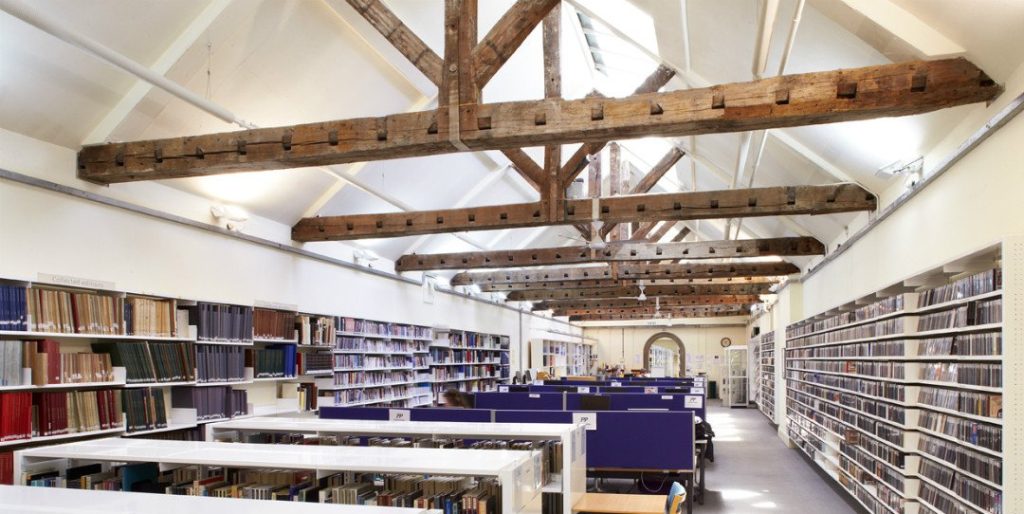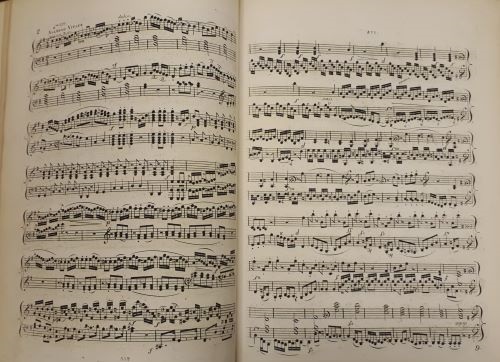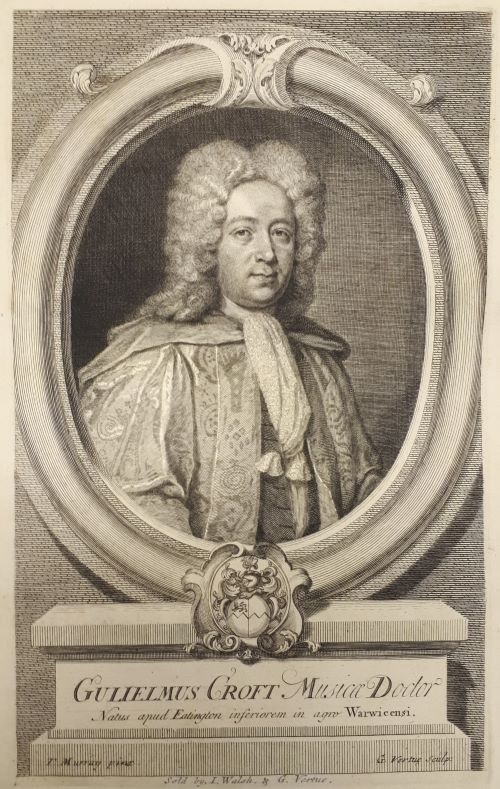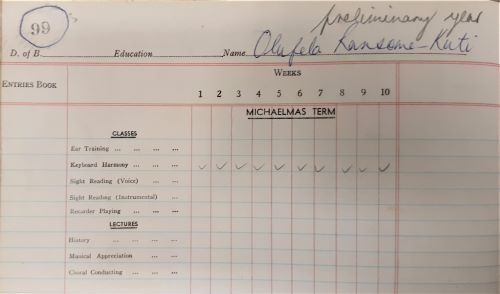Library of the Week: 28th November: We have such a brilliant post this week by our featured library! Find out more about the Jerwood Library of the Performing Arts at the wonderful Trinity Laban Conservatoire of Music and Dance. Thank you so much to the library team for taking part!
This post has been written by several members of the library team here at the Jerwood Library, to tell you all about the history of our library, what it means to be a music library, some of our special collections, and what we’re working on at the moment!
You can read more about the library and what we’re up to on our own blog, where we publish posts to accompany displays and exhibitions we hold in the library, as well as library news and more. Feel free to follow us to keep up-to-date with all things Jerwood Library-related!
Trinity Laban and the Jerwood Library
Edith Speller – Library Manager
The former Trinity College of Music (TCM) was founded in 1872, originally as the Church Choral Society and College of Church Music. By 1880, the curriculum had broadened and its teacher training and system of examinations had become world-renowned. Although the examination body has been a separate organisation since 1993 (Trinity College London), there remain close ties to this day.

In 2001, TCM moved from Mandeville Place in Marylebone to a 17th century building in the Old Royal Naval College in Greenwich, giving the library some impressive roofbeams! The library’s name dates from this time and acknowledges the generous financial support from the Jerwood Foundation which brought the library – previously spread across a dingy basement and 2 other floors – into a beautiful big open-plan space. You can read more about the move and the library’s opening on the Jerwood Library’s blog.
Fast forward to the 21st century and Trinity Laban (TL) was formed in 2005 through a merger between Trinity College of Music and the Laban Centre – a higher education provider in dance, just a few minutes’ walk away in Deptford. Trinity Laban now offers music programmes covering diverse aspects of music education, composition and performance, including classical, jazz, musical theatre and pop, and welcomes students from all over the world.
Access and collections
Anthony McDonald – Librarian
The library is open to current students, staff, and, by appointment, alumni and outside researchers. Current students and staff can borrow printed music, books, and AV material, and can consult on-site printed journals, collected works, reference material, and our special collections material by arrangement with the librarians. They also have access to a wide array of online resources subscribed to by the library. If you would like to visit the Jerwood Library, please read our FAQ for visitors.
Printed Music – How does that make what we do different?
One of the weak points of Dewey’s classification is definitely the way he organised music and books on music, so we use an altered classification scheme created by Lionel McColvin, which fits into the number range for music in Dewey but assigns different call numbers for printed music and books about music. Printed music lies between 780 and 782.99, organised by instrumentation, and books are between 783 and 789.9. This approach makes it much easier for students and staff to find what they need.
Beyond scores and books
The library holds over 70,000 items of printed music, ranging from vocal scores and piano music to chamber sets with parts and oversize graphic scores, and we also have a large collection of CDs, DVDs, and Jazz and Classical vinyl LPs, with two record players for listening in the library! We also hold a large amount of archival music and related material (more on this later).
We don’t just hold music stuff!
We have a section with play texts and books about the theatre, primarily for our musical theatre students, and a selection of books on other subjects, either because the content relates to music in some way or because the material is relevant for wider research on certain programmes. My colleague Harriet recently wrote a blog post about some of the more generally ‘performing arts’ related areas of our collection.
Special collections
Harriet Hansell – Librarian
The Jerwood Library has an assortment of special collections material, which is one of my particular interests! Material includes the archives of TCM, manuscripts, and rare editions of printed music. There’s an overview of the special collections on the TL website, and we welcome researchers to visit us to view items from the collections. You can find more detailed descriptions of our archive material on the Archives Hub and printed music on Jerwood Library Search, although not quite everything is fully catalogued yet! You can also find some images from our special collections on the Jerwood Library’s Flickr page.
Bridge Collection


The Bridge Collection contains over 1000 items of predominately 18th and 19th century rare printed music. This collection didn’t begin as a single entity but contains items of various provenances, acquired through donations, bequests and purchases between 1872 and around 1980. Unfortunately, much of the circumstances of acquisition of these items is now lost to time, as record-keeping has not always been as thorough as it is now…
Bream Collection
The Julian Bream collection is one of several of our collections that include personal notes or manuscripts of composers and other musicians. This collection attracts much interest from guitarists who want to examine Bream’s idiomatic fingerings for standard repertoire or take a look at his own handwritten arrangements of works for guitar. You can read more about Julian Bream and the Bream collection on the Jerwood Library blog.
TCM archive
We frequently receive queries about past students from family history researchers or those researching notable alumni, such as Nigerian composer and performer Fela Kuti, who pioneered the style of music now known as Afrobeat. The archives of the former TCM include many volumes of student registers and even lecture attendance lists, as well as calendars and other records dating back to TCM’s earliest years.

Current Projects
Richard Douglas – Library Assistant
Part of Trinity Laban’s 21st-century mission and vision is to be a forward-thinking and contemporary conservatoire. Here at the Jerwood Library we aim to match that progressiveness and ensure that the library’s collections and services are constantly evolving to meet the needs of its community.
One of the conservatoire’s current initiatives is our Black Culture 365 project, which extends the idea of Black History Month to celebrate Black culture all year round. To support this initiative in the library, we have been highlighting black-led music events to spotlight diverse areas of our collection and expose those areas where we need to do more work. More generally, we’ve been focussing on continuing to broaden our collections to diversify coverage of subjects and authors, and we’re always on the lookout to purchase scores and books by or about underrepresented groups.
More so than in perhaps any other field, female classical composers have been historically side-lined in favour of ‘the greats’, so TL has recently introduced requirements to perform works by female composers for some recitals. We’re helping to facilitate that through our ‘Women composers’ subject heading, which allows students to filter results to just those by female composers, revealing those hidden amongst all the men!
Looking forward to the future, the library staffing structure recently changed to enable the Jerwood Library to work more closely with the Laban Library in the Faculty of Dance. Work has already commenced on sharing good practice across the areas of cataloguing and user education and we’re excited to see what further opportunities this will bring!
Edith Speller – Library Manager, Anthony McDonald – Librarian, Harriet Hansell – Librarian and Richard Douglas – Library Assistant
All images copyright of Trinity Laban, reproduced with kind permission of the copyright holder.
You can explore the library’s collections on Discover and find further contact details on their Discover information page.

